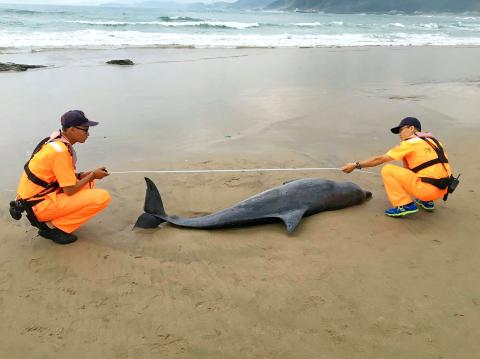A common bottlenose dolphin was found dead on a beach at Guihou Harbor (龜吼) in New Taipei City’s Wanli District (萬里) in the early hours of Wednesday, the latest incident in what is believed to be an unusual spike of stranded dolphins and whales in the aftermath of recent typhoons.
Taiwan Cetacean Society official Yang Wei-cheng (楊瑋誠) said the overwhelming majority of the strandings were likely to have been the result of sonar emissions, which can frighten many species of cetaceans, which use ultrasound for navigation.
Soon after the discovery of the dead dolphin, Coast Patrol Corps 2-1 and Gui Hou Harbour Safety Inspection Office personnel established a cordon and notified the society to remove the animal, sources said.

Photo: Lin Chia-tung, Taipei Times
On Aug. 29, a dolphin was found dead at Green Bay (翡翠灣), less than 1km from the latest incident.
Since Typhoon Megi made landfall on Sept. 28, there have been 12 strandings of whales or dolphins on Taiwan’s coastlines north of Yilan and Taoyuan, with all the animals being deep-sea species that spend time at depths of 1,000m to 2,000m, Yang said, adding that the preliminary results of an investigation would be published in the middle of next month.
In 2005, between 15 and 20 cetaceans were found dead or dying on beaches in northern Taiwan after Typhoon Haitang, Yang said.
At the time, the society enlisted international experts to assist in its research and based on the large volumes of air found in the dead animals’ organs, it was concluded that they died of decompression sickness following a rapid ascent from deep water.
The scientific consensus on cetacean strandings, based mostly on work by Western scientists in the Atlantic Ocean, blames the phenomenon on military-grade sonar, Yang said.
Prior to their death, the animals were probably subjected to sonar emissions from military sources, became terrified and attempted to flee by making a rapid ascent, resulting in fatal decompression, Yang said.
Because many powerful typhoons have passed near Taiwan without incident, a causal relationship between typhoons and strandings cannot be established, Yang said, adding that naval activities concurrent with Typhoon Megi might have caused the strandings.
The quietness of modern submarines has led to a corresponding increase in the power of sonar equipment used to detect them, and the US Navy has placed sonar devices in the waters near Japan’s Ryukyu Islands and the Philippines — to Taiwan’s north and south — to counter the threat of missile-armed submarines from China, Yang said.
Due to those developments, large-scale cetacean strandings will most likely be repeated, Yang said.

A magnitude 4.9 earthquake struck off Tainan at 11:47am today, the Central Weather Administration (CWA) said. The hypocenter was 32.3km northeast of Tainan City Hall at a depth of 7.3km, CWA data showed. The intensity of the quake, which gauges the actual effect of a seismic event, measured 4 in Tainan and Chiayi County on Taiwan's seven-tier intensity scale, the data showed. The quake had an intensity of 3 in Chiayi City and County, and Yunlin County, while it was measured as 2 in Kaohsiung, Nantou County, Changhua County, Taitung County and offshore Penghu County, the data showed. There were no immediate reports of

‘DENIAL DEFENSE’: The US would increase its military presence with uncrewed ships, and submarines, while boosting defense in the Indo-Pacific, a Pete Hegseth memo said The US is reorienting its military strategy to focus primarily on deterring a potential Chinese invasion of Taiwan, a memo signed by US Secretary of Defense Pete Hegseth showed. The memo also called on Taiwan to increase its defense spending. The document, known as the “Interim National Defense Strategic Guidance,” was distributed this month and detailed the national defense plans of US President Donald Trump’s administration, an article in the Washington Post said on Saturday. It outlines how the US can prepare for a potential war with China and defend itself from threats in the “near abroad,” including Greenland and the Panama

The Chinese Nationalist Party (KMT) is maintaining close ties with Beijing, the Democratic Progressive Party (DPP) said yesterday, hours after a new round of Chinese military drills in the Taiwan Strait began. Political parties in a democracy have a responsibility to be loyal to the nation and defend its sovereignty, DPP spokesman Justin Wu (吳崢) told a news conference in Taipei. His comments came hours after Beijing announced via Chinese state media that the Chinese People’s Liberation Army’s Eastern Theater Command was holding large-scale drills simulating a multi-pronged attack on Taiwan. Contrary to the KMT’s claims that it is staunchly anti-communist, KMT Deputy

RESPONSE: The government would investigate incidents of Taiwanese entertainers in China promoting CCP propaganda online in contravention of the law, the source said Taiwanese entertainers living in China who are found to have contravened cross-strait regulations or collaborated with the Chinese Communist Party (CCP) could be subject to fines, a source said on Sunday. Several Taiwanese entertainers have posted on the social media platform Sina Weibo saying that Taiwan “must be returned” to China, and sharing news articles from Chinese state media. In response, the Mainland Affairs Council (MAC) has asked the Ministry of Culture to investigate whether the entertainers had contravened any laws, and asked for them to be questioned upon their return to Taiwan, an official familiar with the matter said. To curb repeated